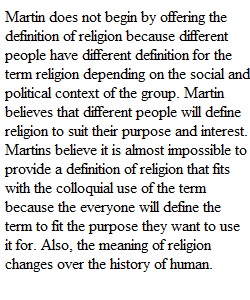


Q Answer the following questions, which correspond with your readings. 1. Why does Martin not begin by offering a definition of “religion”? Why, according to him, is it almost impossible to provide a definition of religion that fits with the colloquial use of the term? 2. According to Martin, what are some common definitions of religion? How do each of these simultaneously capture and leave out common elements of religion? 3. Why does Martin reject the “my religion is true” and “religion is a belief system” approaches to the study of religion? 4. What is a hermeneutics of suspicion, and why does Martin adopt it as an approach to the study of religion? Does such “methodological atheism” necessarily rule out or conflict with religious truth claims? Why? 5. According to Martin, what is the difference between studying religion and being religious? 6. According to Herling, what makes the study of religion pressing and/or necessary in our world today? Make sure to reference pertinent examples, as these appear on the international scene. 7. What religious “type” are you? Provide a brief description of your religious (or non-religious) background and perspective. How do you think this influences your views on religion? 8. Discuss the phenomenological and hermeneutical procedures in the study of religion, as outlined by Herling. What are the advantages and disadvantages of each? 9. According to Herling, why is comparison important generally and in the study of religion? Provide two examples of productive comparisons. 10. According to Herling, what is “defamiliarization”? Why is it important in the study of religion? 11. According to Herling, why is empathy important in the study of religion? What are some of the barriers to the empathetic imagination, especially when it comes to bridging the gap between the academic observer and religious people? Next
View Related Questions